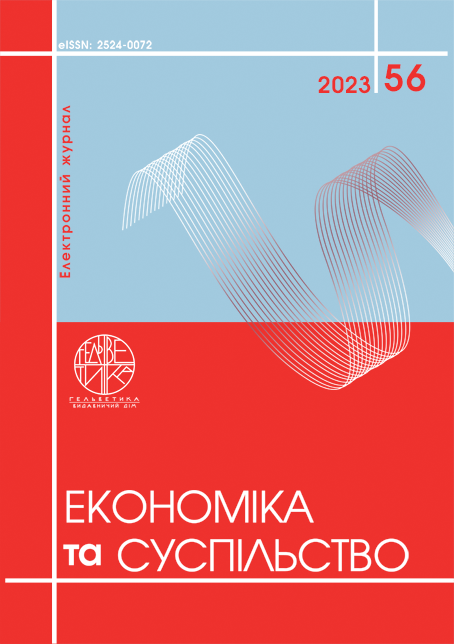СОЦІАЛЬНО-КУЛЬТУРНІ ПРОБЛЕМИ УПРАВЛІННЯ ЯКІСТЮ НА ПІДПРИЄМСТВАХ ІНДУСТРІЇ ГОСТИННОСТІ
Анотація
Стаття присвячена аналізу та узагальненню сучасних соціально-культурних проблем управління якістю на підприємствах готельного та ресторанного бізнесу в різних країнах світу. Проаналізовано наукові праці, в який висвітлено результати досліджень зарубіжними вченими різних аспектів та проблем розвитку сучасної індустрії туризму та гостинності під впливом соціально-культурних факторів. Особливу увагу надано дослідженням, що стосуються забезпечення якості послуг гостинності в мультикультурному середовищі. Проаналізовано дві основні групи соціально-культурних проблем управління якістю на підприємствах індустрії гостинності – пов'язаних із очікуваннями та потребами гостей та пов’язаних із управлінням персоналом в мультикультурному середовищі. Розроблено структурну схему, що висвітлює згадані проблеми. Виокремлено низку соціально-культурних аспектів, які потрібно враховувати з метою забезпечення ефективного функціонування систем управління якістю на підприємствах індустрії гостинності, зокрема різні очікування гостей; мультикультурність сучасного кадрового потенціалу; наявність культурних стереотипів; складну взаємодію процесів регіоналізації і глобалізації; різні концепції часу та стилі спілкування, релігійну та етичну чутливість, звичаї та традиції різних суспільних груп і країн; законодавчі та регуляторні проблеми; мовні бар’єри та ін. Зроблено висновок про те, що розвиток сучасної індустрії гостинності буде залежати від здатності успішно інтегрувати найкращі світові практики з місцевими особливостями, створюючи динамічний асортимент культурно насичених і високоякісних послуг.
Посилання
Баль-Прилипко Л. В., Слободянюк Н. М., Поліщук Г. Є., Паска М. З., Бурак В. Є. Стандартизація, метрологія, сертифікація та управління якістю. Київ: Компринт, 2017. 571 с.
Графська О. І. Проблеми сертифікації та управління якістю у HORECA. Проблеми сучасних трансформацій. Серія: економіка та управління. 2023. №9. DOI: https://doi.org/10.54929/2786-5738-2023-9-12-04
Britton S. G. The political economy of tourism in the third world. Annals of Tourism Research. 1982. 9(3). P. 331-358. DOI: https://doi.org/10.1016/0160-7383(82)90018-4
Choi T. Y., Chu R. Determinants of hotel guests’ satisfaction and repeat patronage in the Hong Kong hotel industry. International Journal of Hospitality Management. 2000. 19(3). P. 227-242. DOI: https://doi.org/10.1016/S0278-4319(01)00006-8
Johns N. Quality Management in the Hospitality Industry: Part 3. Recent Developments. International Journal of Contemporary Hospitality Management. 1993. 5(1). DOI: https://doi.org/10.1108/09596119310026242
Kandampully J., Zhang T., Bilgihan A. Customer loyalty: a review and future directions with a special focus on the hospitality industry. International Journal of Contemporary Hospitality Management. 2015. 27(3). P. 379-414. DOI: https://doi.org/10.1108/IJCHM-03-2014-0151
Milano C., Novelli M., Cheer J. M. Overtourism and tourismphobia: A journey through four decades of tourism development, planning and local concerns. Tourism Planning & Development. 2019. 16(4). P. 353-357. DOI: https://doi.org/10.1080/21568316.2019.1599604
Parasuraman A., Zeithaml V. A., Berry L. L. SERVQUAL: A multiple-item scale for measuring consumer perceptions of service quality. Journal of Retailing. 1988. 64(1). P. 12-40.
Pinke-Sziva I., Smith M., Olt G., Berezvai Z. Overtourism and the night-time economy: a case study of Budapest. International Journal of Tourism Cities. 2019. 5(1). P. 1-16. DOI: https://doi.org/10.1108/IJTC-04-2018-0028
Scheyvens R. Ecotourism and the empowerment of local communities. Tourism Management. 1999. 20(2). P. 245-249. DOI: https://doi.org/10.1016/S0261-5177(98)00069-7
Sequera J., Nofre J. Touristification, transnational gentrification and urban change in Lisbon: The neighbourhood of Alfama. Urban Studies. 2020. 57(15). P. 3169-3189. DOI: https://doi.org/10.1177/0042098019883734
Shareef R., McAleer M. Modelling international tourism demand and volatility in small island tourism economies. International Journal of Tourism Research. 2006. 7(6). P. 313-333. DOI: https://doi.org/10.1002/jtr.538
Tarí J. J., Claver-Cortés E., Pereira-Moliner J., Pereira J. Levels of quality and environmental management in the hotel industry: Their joint influence on firm performance. International Journal of Hospitality Management. 2010. 29(3). P. 500-510. DOI: http://dx.doi.org/10.1016/j.ijhm.2009.10.029
Taylor H. L., McGlynn L. International tourism in Cuba: Can capitalism be used to save socialism? Futures. 2009. 41(6). P. 405–413. DOI: https://doi.org/10.1016/j.futures.2008.11.018
Bal-Prylypko, L. V., Slobodianiuk, N. M., Polishchuk, H. Ye., Paska, M. Z., & Burak, V. Ye. (2017). Standartyzatsiia, metrolohiia, sertyfikatsiia ta upravlinnia yakistiu [Standardization, metrology, certification and quality management], Kyiv: Komprynt [in Ukrainian].
Hrafska, O. I. (2023). Problemy sertyfikatsii ta upravlinnya yakistyu u HORECA [Problems of certification and quality management in HORECA]. Problemy suchasnykh transformatsii. Seriia: ekonomika ta upravlinnia, 9. https://doi.org/10.54929/2786-5738-2023-9-12-04 [in Ukrainian].
Britton, S. G. (1982). The political economy of tourism in the third world. Annals of Tourism Research, 9(3), 331-358. https://doi.org/10.1016/0160-7383(82)90018-4
Choi, T. Y., & Chu, R. (2000). Determinants of hotel guests’ satisfaction and repeat patronage in the Hong Kong hotel industry. International Journal of Hospitality Management, 19(3), 227-242. DOI: https://doi.org/10.1016/S0278-4319(01)00006-8
Johns, N. (1993). Quality Management in the Hospitality Industry: Part 3. Recent Developments. International Journal of Contemporary Hospitality Management, 5(1). DOI: https://doi.org/10.1108/09596119310026242
Kandampully, J., Zhang, T., & Bilgihan, A. (2015). Customer loyalty: a review and future directions with a special focus on the hospitality industry. International Journal of Contemporary Hospitality Management, 27(3), 379-414. DOI: https://doi.org/10.1108/IJCHM-03-2014-0151
Milano, C., Novelli, M., & Cheer, J. M. (2019). Overtourism and tourismphobia: A journey through four decades of tourism development, planning and local concerns. Tourism Planning & Development, 16(4), 353-357. DOI: https://doi.org/10.1080/21568316.2019.1599604
Parasuraman, A., Zeithaml, V. A., & Berry, L. L. (1988). SERVQUAL: A multiple-item scale for measuring consumer perceptions of service quality. Journal of Retailing, 64(1), 12-40.
Pinke-Sziva, I., Smith, M., Olt, G. and Berezvai, Z. (2019). Overtourism and the night-time economy: a case study of Budapest. International Journal of Tourism Cities, 5(1), 1-16. DOI: https://doi.org/10.1108/IJTC-04-2018-0028
Scheyvens, R. (1999). Ecotourism and the empowerment of local communities. Tourism Management, 20(2), 245-249. DOI: https://doi.org/10.1016/S0261-5177(98)00069-7
Sequera, J., & Nofre, J. (2020). Touristification, transnational gentrification and urban change in Lisbon: The neighbourhood of Alfama. Urban Studies, 57(15), 3169-3189. DOI: https://doi.org/10.1177/0042098019883734
Shareef, R., & McAleer, M. (2006). Modelling international tourism demand and volatility in small island tourism economies. International Journal of Tourism Research, 7(6), 313-333. DOI: https://doi.org/10.1002/jtr.538
Tarí, J. J., Claver-Cortés, E., Pereira-Moliner, J., & Pereira, J. (2010). Levels of quality and environmental management in the hotel industry: Their joint influence on firm performance. International Journal of Hospitality Management, 29(3), 500-510. DOI: http://dx.doi.org/10.1016/j.ijhm.2009.10.029
Taylor, H. L., & McGlynn, L. (2009). International tourism in Cuba: Can capitalism be used to save socialism? Futures, 41(6), 405-413. DOI: https://doi.org/10.1016/j.futures.2008.11.018

Ця робота ліцензується відповідно до Creative Commons Attribution 4.0 International License.


